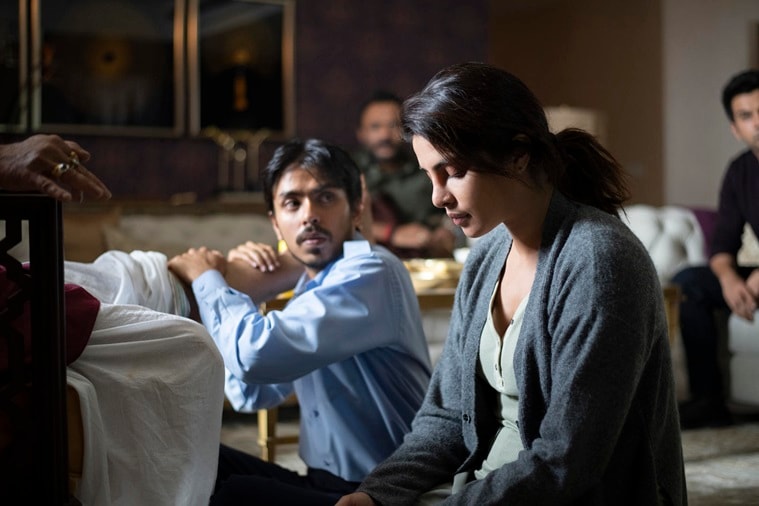Want to do stories that speak to me: The White Tiger actor Adarsh Gourav
His role as the protagonist Balram Halwai has brought Adarsh Gourav, 26, wide appreciation since the Ramin Bahrani-directed film The White Tiger released on Netflix in late January. An adaptation of Aravind Adiga’s Man Booker prize-winning 2008 debut novel of the same name, the story critiques India’s deeply entrenched classism and cracks in its democratic system. The role has earned Gourav a Best Actor nomination in the US’ Independent Spirit Awards alongside Riz Ahmed (Sound of Metal) and Chadwick Boseman (Ma Rainey’s Black Bottom).
The Jamshedpur-born made his acting debut as young Shah Rukh Khan in My Name is Khan (2010), and made a mark with his roles in Manoj Bajpayee-starrer Rukh (2017) and Sridevi-starrer Mom (2017). But it was his subservient Balram’s transformation into a scheming employee, raging against the system, and then, becoming a successful entrepreneur that won high praise. He will be seen next in a short film written-directed by Varun Grover. Excerpts:
How did you prepare for a character like Balram Halwai?
With The White Tiger, I had the bonus of nearly three months before the shoot started. I packed my bags and moved to the village of Akshay Nayak, whom I had befriended just a week earlier, in Jharkhand. I stayed with his family and asked him not to tell anyone that I’m an actor. I wanted to have a pure experience of village life and become a part of his friend circle. After that, I moved to Delhi and worked in a restaurant in Saket where I was cleaning plates and running small errands. After the reading started, Ramin asked me if I wanted to be present during the audition of other actors. I jumped at the offer as it gave me the opportunity to try different scenes with other actors and figure out what works.
 Adarsh Gourav and Priyanka Chopra Jonas in a still from The White Tiger.
Adarsh Gourav and Priyanka Chopra Jonas in a still from The White Tiger.
The novel on which the movie is based is already a success. Did you anticipate the movie to get this kind of praise?
The book is a Man Booker Prize winner and the cast features Rajkummar Rao and Priyanka Chopra. So, one can anticipate that people would be watching its screen adaptation but you can’t predict the reception it’d get. It’s come as a welcome surprise that people have connected with Balram.
You dominate the screen time in The White Tiger. Did it intimidate you?
I didn’t think of it. This kind of film and role comes an actor’s way every 10-15 years. I capitalised on that opportunity. Other than being on the set, I enjoy experiencing a character’s backstory. I wanted to ensure that I’m honest to myself, that’s why I went to the village.
There’s a lot going on in Balram’s head. How did you approach that?
All of us have that kind of duality. He has that ingrained servitude. He would do anything for his employers and even cover up a murder that wasn’t his fault. He is different at home — he doesn’t like his grandmother and is critical of his brother. The way the script was written brings out the duality in him.
Did you go on a diet for the role?
I did. When I was in the village, I couldn’t eat properly for a week as I had food poisoning. I lost five kilograms. When I saw myself in the mirror, I noticed my sunken cheekbones. I believed I looked more like Balram then. I continued to eat less for the entire duration for The White Tiger’s shoot.
Is the Spirit Awards nomination a validation of your efforts? Are you now hoping for more international projects?
Getting this film was validation and this nomination is a reward. I can’t expect anything more, it’s incredibly humbling. I’m hoping to get not just international projects but interesting Indian projects. I don’t want language to be a barrier. I’m looking forward to being a part of stories that speak to me and work with directors who love to experiment and present what they have to say in a unique way. My ambition is to play as many different characters as possible. I also want to live their journeys in some ways, so that I can evolve as a person and a better actor. Most critical for me when choosing a project are the story and director. A lot depends on how a director chooses to interpret a story.
Are you disappointed that Rukh and Mom didn’t give you more visibility?
Not at all. They were both incredible learning experiences for me. Working with Pooja Gupte and Atanu Mukherjee on Rukh and Ravi Udyawar on Mom helped me find myself as an actor. I don’t think I would have been here had I not acted in either of those films.
How special was it to play the younger Shah Rukh Khan in My Name Is Khan?
I was just excited to be on the sets, to play the role of young Shah Rukh Khan and meet Karan Johar. That’s how my family treated it too. No one imagined that acting would be my career one day.
You are a vocalist, too. What made you devote more time and effort to acting?
I was pursuing both acting and singing in college. I used to write songs for a band and perform regularly. It was when I played Joydip Ganguly in Banana, shot in 2013 in my Jamshedpur school, directed by Sajid Ali and produced by John Abraham, that I discovered the thrill of acting. I started watching more films, reading more books, and joined the Drama School Mumbai a few years later.
